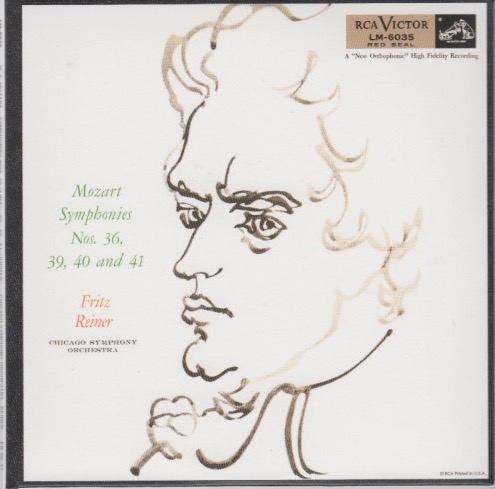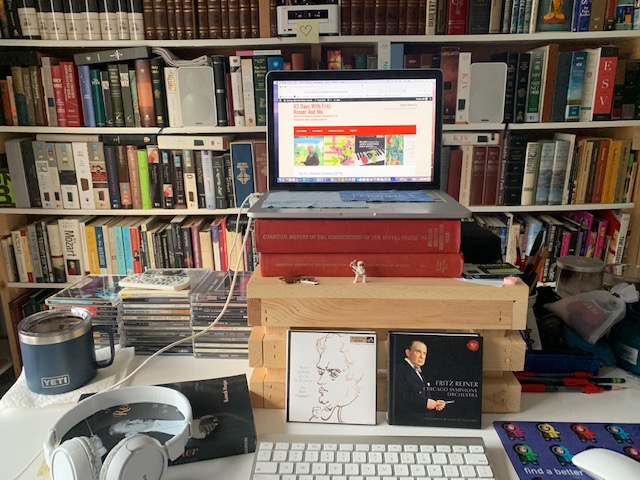
Now this is more like it.
Whenever I think of Classical music, I think of composers from the Classical period – Haydn, Mozart, Beethoven, et al. Also, I think of Anton Bruckner, who straddled Classical and Romantic, but whose symphonies (to me) seem more Classical than Romantic in their construction.
Essentially, I think of composers who wrote mesmerizing and magical symphonies and sonatas and concertos.
Don’t get me wrong. Bach is great. But period instruments like the harpsichord sound like fingernails on a chalkboard to me.
And the Baroque style can get tiresome, even though it’s one of the most distinctive eras in music history. A little Baroque goes a long, long way.
But music from the Classical period – like what I’m listening to this morning – I can hear repeatedly, for decades.
Except…
I don’t know how Fritz Reiner and the Chicago Symphony Orchestra did it. But, somehow, they managed to suck all the life out of Mozart’s symphonies and leave me with a hollow pickle. (Inside joke: one summer my wife and I were visiting a beach along Michigan’s “west coast.” A snack shop was on the beach. She wanted a cold pickle. When she brought it back to where we were sitting she discovered it was a hollow pickle. She was crushed because she really wanted a pickle. I was furious because I knew there’s no way a clerk could hand someone a hollow pickle and not know it. So I figured it was done intentionally. Ever since, whenever my wife and I want to express our disappointment about a situation we call it “a hollow pickle.” Sure, we can laugh about it now.)

This album is a hollow pickle.
I’ve never heard Mozart played with so little feeling, flamboyance, or magic.
From a technical point of view, I assume all of the musicians are playing superbly. Flawlessly, even – especially since Fritz Reiner demanded no less.
But something is wrong.
I’m not feeling it.
I’ll keep listening (I’m on pass #3 and while likely hear this album 3-4 times through before I’m done).
The Objective Stuff
According to its entry on Wikipeida,
The Symphony No. 36 in C major, K. 425, also known as the Linz Symphony, was written by Wolfgang Amadeus Mozart during a stopover in the Austrian town of Linz on his and his wife’s way back home to Vienna from Salzburg in late 1783. The entire symphony was written in four days to accommodate the local count’s announcement, upon hearing of the Mozarts’ arrival in Linz, of a concert. The première in Linz took place on 4 November 1783. The composition was also premièred in Vienna on 1 April 1784. The autograph score of the “Linz Symphony” was not preserved, but a set of parts sold by Mozart to the Fürstenberg court at Donaueschingen in 1786 does survive.
Mozart was 27 when he composed the Linz Symphony.
According to its entry on Wikipedia,
The Symphony No. 39 in E♭ major of Wolfgang Amadeus Mozart, K. 543, was completed on 26 June 1788
The Symphony No. 39 is the first of a set of three (his last symphonies) that Mozart composed in rapid succession during the summer of 1788. No. 40 was completed on 25 July and No. 41 on 10 August. Nikolaus Harnoncourt argues that Mozart composed the three symphonies as a unified work, pointing, among other things, to the fact that the Symphony No. 39 has a grand introduction (in the manner of an overture) but no coda.
Mozart was 32 when he completed this symphony.
Both of these symphonies were recorded in Orchestra Hall. Symphony No. 36 was recorded on April 26, 1954. Fritz Reiner was 66. Symphony No. 39 was recorded on April 23, 1955. Fritz Reiner was 67.
The Subjective Stuff
Recording quality: 2.5
Overall musicianship: 2.5
CD booklet notes: 2
CD “album cover” information: 0
How does this make me feel: 0
The “original album art” approach provided me with the near equivalent of the Beatles’ White Album. Nothing on the back. Only a few words on the front. There’s not even warning on the back to be aware of the blunt needle!
Maybe it’s the mono recording that flattens this performance and squeezes the life out of it. Now, before you accuse me of being a monoist, let me explain that I have many mono recordings of Classical music in my collection. One is an arm’s length away, in fact: Wilhelm Furtwangler conducting the Berliner Philharmoniker playing Anton Bruckner’s Symphony No. 5, recorded in 1942-1944 for the DG label. The recording is ancient. And very mono. And yet the performance crackles with life. So don’t call me a monoist.
Maybe I’m just not in a great mood so my normal response to Mozart is suppressed.
That’s why this is called Subjective Stuff. These are my opinions. Others might hear these same performances and tell me this is a fantastic recording, performed to perfection, with all of the vim and vigor one expects from a Mozart composition.
To each his own.
I’m not likely to listen to this recording ever again.
